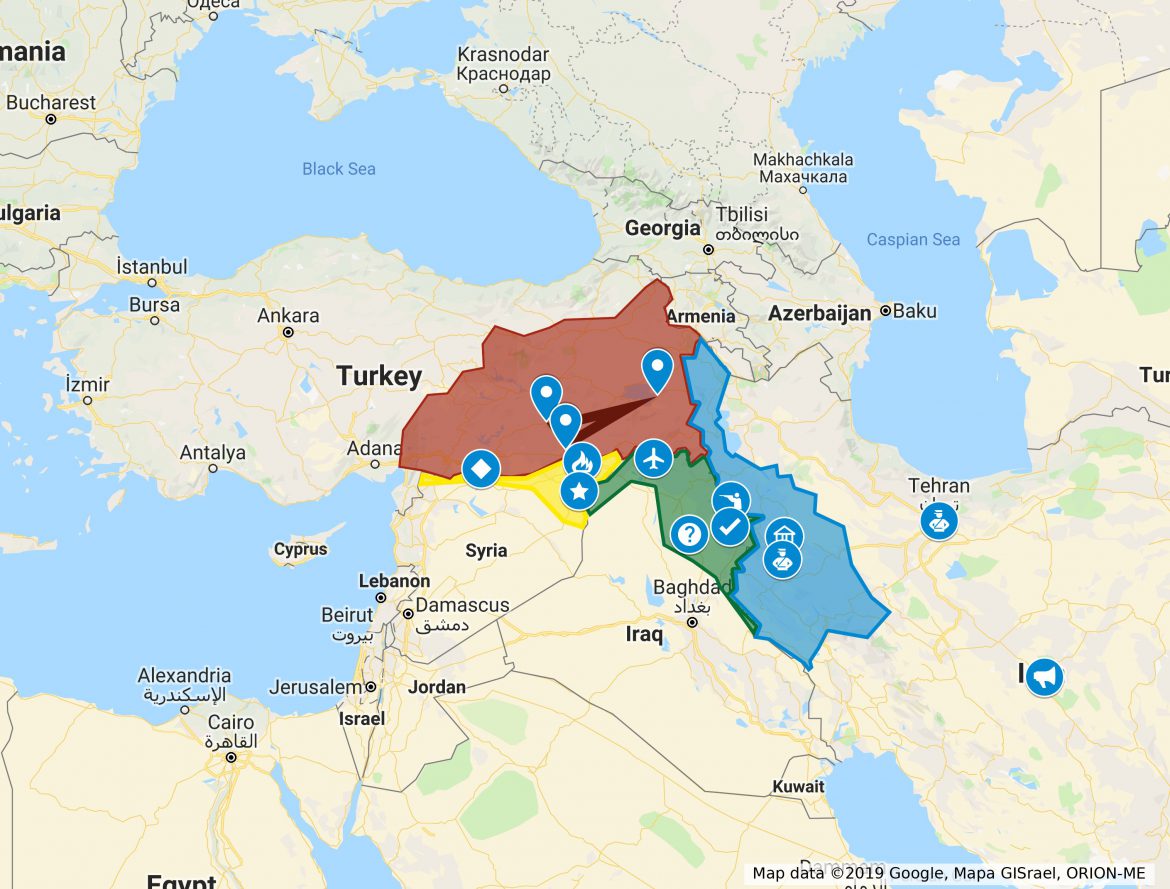981
Iran
- On August 16, the United Nations General Assembly published a report on the human rights situation in Iran from Javaid Rehman, the Special Rapporteur on human rights in the Islamic Republic of Iran. The report discusses the Iranian regime’s multitude of human rights violations, including its persecution of minorities. According to the report, Kurds comprise half of Iran’s political detainees and are the number one recipient of political executions. The report also addresses the regime’s ban on the Kurdish language for educational purposes and states, “The Special Rapporteur is also concerned about the reported persecution of Kurdish language teachers, including one young female teacher, Zara Mohammadi, who was arrested and detained by the Iranian authorities on May 23, 2019 for organizing private instruction without a permit in Sanandaj.”
- More Kurds were arrested and sentenced in the Kurdish region of Iran last week. The Islamic Revolutionary Court of Sanandaj sentenced Kurdish activist Zaniar Zamiran to three months in prison. Zamiran had been jailed since December 2018 and was charged with “propaganda against the Islamic Republic.” Sanandaj’s Islamic Revolutionary Court also sentenced an activist from Kamyaran, Omed Assadi, to one year in prison for “propagandizing for a Kurdish opposition party.” In Tehran, security forces detained a Kurdish writer and social affairs researcher named Kamil Ahmadi. Ahmadi’s wife later announced on social media that her husband has been sentenced to one month in prison and offered no further elaboration regarding any charges. In Sardasht, Iranian security forces injured a Kurdish businessman named Sabir Bapiri when, according to the Kurdistan Human Rights Association (KMMK), they opened fire on his vehicle.
Iraq
- According to a recently released memorandum from the Interior Ministry of Iraq, 27 more Kurds have been removed from security posts in Kirkuk Province and replaced by Arabs and Turkmen. Kurds have now been replaced in around 70 security positions in Kirkuk since Iraqi forces and Iranian-backed militias seized control of the province on October 16, 2017. Meanwhile, an increasing number of ISIS (Da’esh) attacks in south and southwest Kirkuk have forced dozens of Kurdish families of the Kaka’i belief to flee the area, as Iraqi forces remain incapable of establishing security in the region.
- The Turkish military’s incursion into Iraqi Kurdistan targeting the headquarters of the Kurdistan Workers’ Party (PKK) continued amid reports of airstrikes on several locations in the region. The strikes hit Sanganer and villages near Qandil. On Tuesday, an airstrike hit a vehicle in a village near Duhok. It was not immediately clear who the vehicle’s occupants were.
- Following several internal meetings, the Change Party (Gorran) settled on Mustafa Said Qadir as its official party nominee to become the Vice President of Iraqi Kurdistan.
Syria
- On Sunday, a car bomb detonated in Qamishli and killed one Kurdish security officer (Asayesh) while wounding at least one other. Da’esh claimed responsibility for the attack. Despite its territorial defeat in March 2019, the terrorist organization continues to pose a threat to the region through the use of guerrilla tactics like bombings and arson attacks.
- Kurdish authorities transferred four children of Da’esh fighters to German officials for repatriation on Monday. The Syrian Democratic Forces (SDF) maintain custody of approximately 70,000 family members of former Da’esh fighters. SDF officials have urged foreign governments to repatriate their citizens who traveled to fight for Da’esh, but many Western governments have stalled or declined to do so. These four children were the first citizens repatriated by the German government.
- On Friday, the Ministry of Foreign Affairs of the Russian Federation reiterated its support for the Syrian regime’s reacquisition of all territory lost during the Syrian Civil War. A Russian spokesperson stated that “attempts to isolate Syria’s northeast are a source of growing concern,” and urged dialogue between Damascus and the Autonomous Administration of North and East Syria (AANES). President Bashar al-Assad previously expressed a desire to retake territory his government lost in the nine-year civil war, saying he would do so “by force” if necessary.
Turkey
- On Monday, the Turkish government removed three Kurdish mayors from their offices and replaced them with government loyalists. The sacked mayors included the veteran Kurdish politician Ahmed Turk, who was previously the mayor of Mardin. The removal of the Kurdish mayors raised anger among Kurds and the pro-Kurdish Peoples’ Democratic Party (HDP). Thousands of Kurds across Turkey took to the streets and protested the Turkish government’s decision. To stifle the protests, Turkish police detained around 500 people, most of whom were HDP supporters. Meanwhile, the co-chair of the HDP called upon people to express their opposition to the decision. On Tuesday, the appointed government loyalists removed 29 Kurds from the staff of the mayorship of Diyarbakir following the removal of the city’s Kurdish mayor. The Turkish actions were denounced by some European lawmakers while police attacks on protesters occurred in Ankara, Istanbul, Dersim, Diyarbakir, Van, Erzurum and Bitlis.

